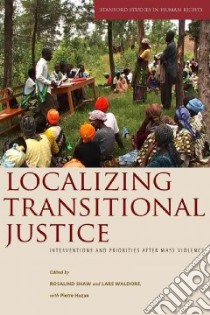Localizing Transitional Justice - 9780804761505
Un libro in lingua di Shaw Rosalind (EDT) Waldorf Lars (EDT) Hazan Pierre (EDT) Teitel Ruti G. (INT) edito da Stanford Univ Pr, 2010
- € 28.10
- Il prezzo è variabile in funzione del cambio della valuta d’origine
"Localizing Transitional Justice addresses extremely current debates on trasitional justice and post-conflict justice interventions, bringing together a range of excellent cases. The contributors are doing some of the most exciting, cutting-edge work in this area. Together, they have written a sterling book which maps out a new field with remarkable breadth and clarity. It will definitely be a key reference in the field." Rachel Sieder Centro de Investigaciones y Estudios Superiores en Antropologia Social (CIESAS), Mexico
"Full of innovative ideas, trenchant critiques, and smart recommendations for how we should approach and conceive of transitional justice today. Its distinction between post-repression and post-war transitional justice, its critique of equating the local with the traditional, and its incisive assessment of the `toolkit' apprach to transitional justice make this book a powerful new contribution to the study of human rights." Mike McGovern Yale University
Through war crimes prosecutions, truth commissions, purges of perpetrators, reparations, and memorials, transitional justice practies work under the assumptions that truth telling leads to reconcilation, prosecutions bring closure, and justice prevents the recurrence of violence. But when local responses to transitional justice destabilize these assumptions, the result can be a troubling disconnection between international norms and survivors' prioritiies.
Localizing Transitional Justice traces how ordinary people respond to---and sometimes transform---transitional justice mechanisms, laying a foundation for more locally responsive approaches to social reconstruction after mass violence and egregious human rights violations. Recasting understandings of culture and locality prevalent in international justice, this vital book explores the complex, unpredictable, and unequal encounter among international legal norms, transitional justice mechanisms, national agendas, and local priorities and practices.
Informazioni bibliografiche
- Titolo del Libro in lingua: Localizing Transitional Justice
- Sottotitolo: Interventions and Priorities After Mass Violence
- Lingua: English
- Autori : Shaw Rosalind (EDT) Waldorf Lars (EDT) Hazan Pierre (EDT) Teitel Ruti G. (INT)
- Editore: Stanford Univ Pr
- Collana: Stanford Univ Pr (Paperback)
- Data di Pubblicazione: 23 Aprile '10
- Genere: SOCIAL SCIENCE
- Argomenti : Transitional justice Human rights Crimes against humanity
- Pagine: 344
- ISBN-10: 0804761507
- EAN-13: 9780804761505


